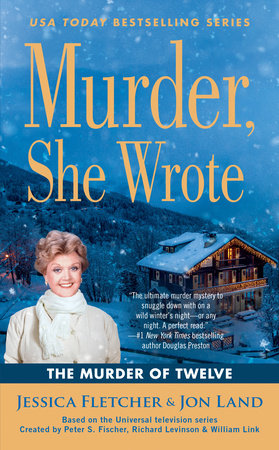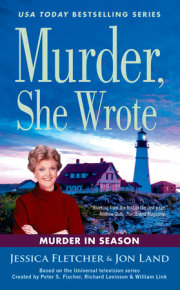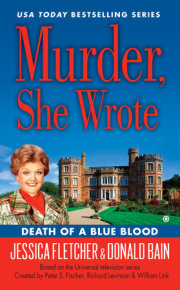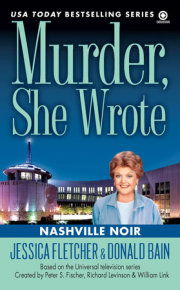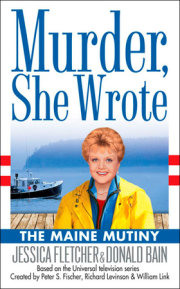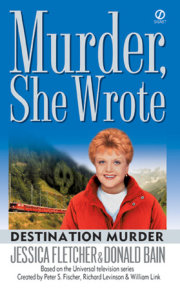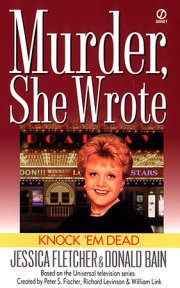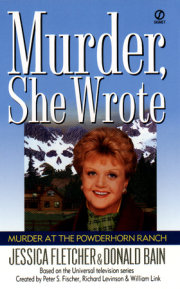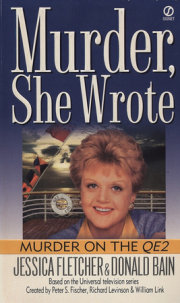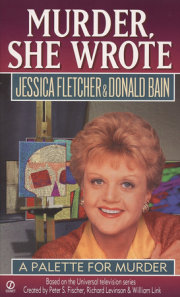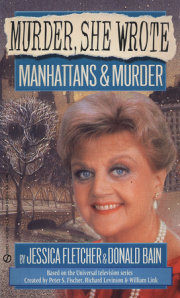Chapter One
Gonna be a killer for sure, Jessica."
Seth Hazlitt looked at me across the table at Mara's Luncheonette. I couldn't tell whether he was sniffing the air for a hint of the coming snowstorm or soaking up the aroma of his hot-out-of-the-oven morning blueberry muffin.
"This'll be one we'll be battening down the hatches for, ayuh."
Sheriff Mort Metzger peeked out from behind his copy of the Cabot Cove Gazette. "You say that at least once every year."
"And every year it turns out to be true," Seth countered.
"Tell me again how it is Cabot Cove suffers a once-in-a-century storm every winter."
"Just lucky, I guess," I said, noticing the headline splashed across the top of the paper's front page read simply, blizzard!
Local forecasters were predicting upwards of two feet, while the Weather Channel had the amount closer to three. But Dr. Seth Hazlitt, our resident family doctor and certified curmudgeon, shook his head furiously when I voiced those estimates.
"Nope. We're looking at four, maybe five, feet for sure. I can tell. It's all in the nose," he said, and pinched his nostrils.
Mort looked less than convinced. "And how's that, exactly?"
"I can smell it on the air. Smelled it back in 2013 for Nemo, when we got thirty-two inches in these parts, and two feet in 1979, before they started giving storms names."
"How about 1952?" Mort quipped. "Or the storm back in 1935?"
"Who's asking, since Maine was just a speck on the map for you until you up and retired here?"
"Both of those dumped around two feet all the same, Doc."
"Nothing compared to what we're going to see this time," Seth assured us both.
"Have they given a name to this storm yet?" I wondered aloud.
"No idea," Mort said.
"Think they're up to the letter J or maybe K," Seth suggested.
I turned my gaze out Mara's front window in anticipation of the first fall of flakes. It had been a habit of mine since I was a little girl when a storm was in the forecast. There's something uniquely serene about being somewhere safe and sound as the snow begins to mount, about being home while the world beyond stands still amid a growing blanket of white. Of course, home for me for some months now had been Cabot Cove's Hill House hotel. Construction problems and challenges had repeatedly delayed returning to my beloved home at 698 Candlewood Drive. So I would be watching the snow pile up through the window of my suite instead.
A week ago, the forecasters predicted a bad storm in the eight-to-twelve-inch range. That had given way to warnings of a blizzard, and as of this morning, something in the potentially monstrous range, a record setter by all accounts. A winter storm warning encompassed all of New England, and the storm steaming northward had begun to intensify over Boston. If the forecast held, we'd see the first flakes in early afternoon, with measurable snow within an hour or two. After that, it was anyone's guess. The Cabot Cove Public Works Department maintained only two dedicated plows but usually contracted a half dozen local vendors, many of them fishermen and landscapers looking to boost their winter income. For this storm, though, Mort had mentioned that twice that number, an even dozen, had been retained. The main roads that ran into, out of, and around our town were the responsibility of the state, fortunately. And, in my mind, anyway, the lack of traffic that accompanied the foreboding forecast proved a welcome relief from the ever-growing number of seasonal visitors who besieged Cabot Cove during the summer months.
"Why stare out the window, Jess," Seth Hazlitt said to me, "when I told you the snow wasn't going to start until one-ish?"
"What time is that, exactly?" Mort asked him.
"What time is what, exactly?"
"One-ish."
"Sometime between one and two o'clock, but not after one thirty, because that would be two-ish."
"Oh," Mort noted, as if that were some kind of revelation. "Well, there's one good thing about a blizzard, Mrs. F.," he added, turning toward me.
"No crime?"
"Murders, specifically, with everybody pretty much stranded."
"I wouldn't be too sure about that, Sheriff," Seth groused. "During the blizzard of 'seventy-nine, Agnes Menfredi took a frying pan to her husband, George's, head when he wouldn't shovel their walk. Ended up with a concussion that stole a whole bunch of his memory for a time, not a bad thing, given that Agnes was the kind of woman you wanted to forget. I'd opened my practice the year before, and I remember trudging my way over to the Menfredi home because the rescue squad got stuck in a snowdrift."
Mort Metzger was nodding. "Don't tell me, Doc. Uphill all the way."
"As a matter of fact . . ."
Seth's voice had already faded when I heard a Cabot Cove Sheriff's Department dispatcher's voice through Mort's shoulder-mounted microphone.
"You read me, Sheriff?"
"Loud and clear."
"You're needed at the old textile mill off Route One. Abandoned vehicle. Deputy Jenks just called it in."
"Why's he need backup for an abandoned vehicle?"
"Because he found a dead body inside."
ThereÕs a part of Cabot Cove located on the townÕs outskirts that nobody talks about much anymore. ItÕs part of our legacy and our past dating back long before the world discovered our village, which had remained quaint and isolated for so long. IÕm talking about an area devoted to industry, primarily textile mills that had been set up during the Industrial Revolution. The largest of these was the long-shuttered and crumbling Cabot Manufacturing Company. It had been saved from being razed only by our local historical societyÕs designation of it as a landmark, marked as such by a plaque that had to be glued in place over the entrance since it was feared nailing the plaque might lead the rotting faade to collapse.
In a gravel parking lot we found a plain dark sedan, centered in the shadow of a still-massive structure that seemed to shed fresh parts of itself with every stiff wind.
"Thanks for coming along for the ride, Mrs. F.," Mort said, parking his department-issue SUV near the patrol car that had come upon the vehicle during a routine sweep of the area, "even though this one's not up your alley."
"We'll see about that, ayuh," Seth Hazlitt said from the cruiser's backseat. "Since when did you know a death in Cabot Cove that wasn't murder?"
"There was Gladys McCrady just last week," Mort answered, throwing open his door.
"She was a hundred and one," Seth reminded him. "Used to tell me at her checkups she enjoyed a spot of gin every day since she was fifty and said it was the reason she'd lived so long."
Mort turned to flash me a look before climbing out of the SUV. "I could see how this town could be enough to drive anyone to drink, and I don't mean for medicinal purposes either."
I started to exit from the passenger side and accepted Seth's help in getting out. He'd accompanied us because, in the absence of a full-time medical examiner, Seth had long maintained the role of de facto coroner, something he'd gained considerable experience in over the years through both Amos Tupper's tenure as sheriff and then Mort Metzger's after Amos had retired to live with his sister in the Midwest.
At first glance, especially under gloomy skies, the remains of the Cabot Manufacturing Company looked like something out of a Stephen King novel. The weather-beaten wood-frame structure had been expanded so many times it was hard to tell where the building's original footprint ended. The building stretched three stories high in some areas and four in others to account for the sprawling, high-ceilinged factory floor where hundreds of workers had operated the presses, lathes, and cutting stations that produced tons of tailored cloth on an annual basis. Three shifts over twenty-four hours a day was the standard practice during the boom times of war years, when the need for uniforms drastically increased the factory mill's overall output. Some of the wings farthest out and the older, single-story storage sections that had been damaged by fire either had collapsed or looked like they were about to at any minute.
The central part of the building, and likely the oldest, stood reasonably strong, though, in spite of the fact that the wood had turned so dark with rot and age that the frame looked charred. Listen hard enough, the tour guides from the Cabot Cove Historical Society used to say when the building had been open for viewing, and you might hear the sounds of the lathes fashioning material. Look hard enough and you might be able to glimpse smoke wafting out of the crumbling brick chimneys. Where the original building's faade didn't look charred, it had been ravaged by our harsh winters and summer sun. In short, the Cabot Manufacturing Company had the look of a building Seth Hazlitt would have already pronounced dead, had that been part of his role as de facto town coroner.
He had his trusty old leather doctor's bag in hand as he trudged alongside Mort across the weed-speckled parking lot. I followed, feeling the hard gravel crunching beneath my heavy winter shoes. Strange how Seth always lugged that bag along with him on trips like this, even though inside were tools for checking or maintaining people's health as opposed to passing judgments on their deaths. Come to think of it, I'd glimpsed Seth actually extract something on only a few such occasions, and then just a stethoscope, really, to confirm the deceased person's heart had indeed stopped beating.
Seth seemed to be sniffing the air as he walked. "Gonna be a bad one, all right," he noted, even though the flakes hadn't started falling yet. "Worst we've ever seen, by the look of things."
"You mean smelled," Mort said. "That's what you were doing-smelling the air."
"I know what I was doing and I was looking at it too. Very first flakes are there to see if you look hard enough."
I'd drawn even with them on Mort's side by then and he shot me a glance.
"He's got a point, Mort. I think I can see them too."
Mort took off his Cabot Cove Sheriff's hat and scratched at his scalp through his still-thick salt-and-pepper hair. "Is it too late to unretire from my last job?"
"Think the NYPD would have you back after all these years?"
"With bells on, thanks to all the experience I've gained in Cabot Cove."
Rosy-cheeked, freckle-faced Deputy Andy approached when we neared the sedan he'd posted himself near.
"Morning, Sheriff." He moved his eyes to Seth and me, adding, "Doc, Mrs. Fletcher."
At that point I could see a man behind the wheel who was slumped backward in the seat as if he were taking a nap. His mouth had locked open in a crooked fashion and his gaze was utterly empty. I also noted the discolored patch of gravel directly in line with the vehicle's tailpipe and figured that for a clear indicator that he'd died of carbon monoxide poisoning. Either suicide, which seemed unlikely, or a tragic accident after he'd drifted off to sleep with the engine still running and windows all closed up tight.
Force of habit led me to touch the tailpipe, only to find it cold and dry even at the end. While Mort crouched with his hands on his knees to peer inside the cab, I moved to the hood and found it similarly cool to the touch, indicating the victim behind the wheel had likely been dead for some time. The road off which the factory mill was located was hardly ever traversed, and even the nearest main road, Route 1, saw little traffic these days. This dying, or already dead, part of Cabot Cove stood in stark contrast to the parts of our village that were thriving closer to the coast and the center of town. I imagined there were stretches when you could count on your fingers the number of vehicles that passed down this road for days at a time, which explained why the Sheriff's Department didn't know of the car's presence, or of the dead man inside, until Deputy Andy spotted it during his rounds. The corpse of the man slumped behind the wheel looked lonely more than anything else amid the otherwise empty gravel parking lot. And, come to think of it, "lonely" was as good a way as any to describe the Cabot Manufacturing Company itself in its current state.
Mort pulled on his evidence gloves, which looked identical to the pair Seth squeezed over both hands in order to examine the deceased. Mort found the Ford Five Hundred's driver-side door in pristine condition and unlocked. When he eased it open, the dead body rocked and nearly spilled out.
"Yup," Seth said after a brief examination of the corpse, "it was carbon monoxide poisoning all right, almost for sure." He ran a small penlight about the man's face to better regard the skin's texture and tone. "You can tell by the cherry pink coloring of the skin. Yup, plain as day in my mind."
"Accident or suicide, Doc?" Mort asked him.
"Hard to say at this point. Suicides normally snake a tube inside the car from the tailpipe to quicken the procedure, but there's no indication of that here, obviously, which leads me to believe the victim parked, left his engine on to stay warm, then drifted off to sleep . . . and death."
"Can you get his wallet for me, Doc?"
I watched Seth maneuver the body, and his gloved hands, to fish the wallet from the man's back pocket. He handed it over to Mort, who eased it open as I looked on. We saw the distinctive ID at the same time, above a chintzy-looking badge.
"Loomis Winslow, private eye out of Boston," Mort noted, flapping the wallet, more an ID case, in the air. "Must not have noticed the 'Welcome to Cabot Cove' sign. Anybody in their right mind sees that and turns around."
"Tell that to the summer people, Sheriff," Seth said, continuing his preliminary examination of the body.
"After you tell me how long he's been dead."
"Since late last night or very early this morning, based on the settling of the blood and level of rigor mortis. Say as much as twelve hours, as few as six."
Mort turned toward me. "Here's how I see it, Mrs. F. Man pulls into an abandoned parking lot to make a phone call or something and falls asleep with the engine on to keep warm. Must've had the misfortune to have enough gas left in the tank to make sure he never woke up again. Case solved."
Copyright © 2020 by Jessica Fletcher. All rights reserved. No part of this excerpt may be reproduced or reprinted without permission in writing from the publisher.





